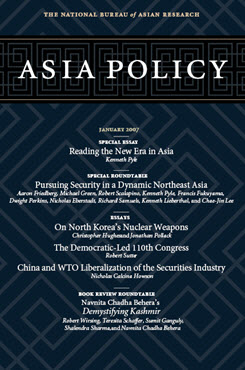North Korea's Nuclear Weapons
Implications for the Nuclear Ambitions of Japan, South Korea, and Taiwan
This article evaluates the nuclear intentions of Japan, South Korea, and Taiwan in the wake of North Korea’s October 2006 nuclear test.
EXECUTIVE SUMMARY
MAIN FINDINGS
Even in the event of an unstoppable North Korean nuclear program, none of the four principal drivers of nuclear proliferation are sufficient or confluent enough to shift Japan, South Korea, or Taiwan toward active nuclear weapons programs:
- National security – The national security dilemmas vis-à-vis North Korea are not yet strong enough; Japan and South Korea still see opportunities for diplomatic engagement and conventional deterrence; and—most crucially—Japan, South Korea, and Taiwan do yet fear sufficiently the alliance dilemmas of U.S. entrapment or abandonment.
- Prestige, identity, and norms – National prestige and identity create temptations for nuclear proliferation, which however are also countered by domestic pressures for conformity with norms and regimes for non-proliferation.
- Domestic political economy – Japan, South Korea, and Taiwan have only a minimal vested economic interest in nuclear weapons development, and the overall international economic costs militate against nuclear armament.
- Technological capability – All three countries may have the eventual technological capacity to develop nuclear weapons, but this capacity would be slow in coming and would constitute a poor substitute for U.S. extended nuclear deterrence.
POLICY IMPLICATIONS
- Washington still has the capacity to prevent further proliferation by revisiting U.S. policy toward the four principal nuclear drivers.
- Of benefit would be for the U.S. to move through diplomatic efforts and the upgrading of its alliances both to control security dilemmas involving North Korea and to reaffirm its extended nuclear guarantees. The U.S. would need, however, to assert deterrence more than pre-emption so as to avoid entrapment and alliance dilemmas.
- Also beneficial would be if the U.S. would show a re-adherence both to international and regional expectations for minimizing the role of nuclear weapons in regional security and to norms and regimes of non-proliferation.
- Furthermore, of benefit as well would be for the U.S. to continue to provide technological and economic incentives and disincentives to nuclear proliferation.
About Asia Policy
Asia Policy is a peer-reviewed scholarly journal presenting policy-relevant academic research on the Asia-Pacific that draws clear and concise conclusions useful to today’s policymakers. Asia Policy is published quarterly in January, April, July, and October and accepts submissions on a rolling basis. Learn more


